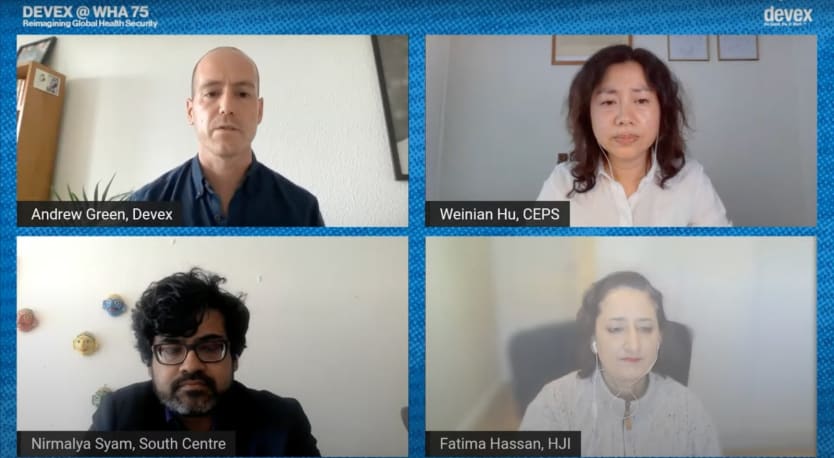
Some of the member states identified as collaborators on a proposal to temporarily waive patent protections on COVID-19 vaccines, which is currently under intense discussion at the World Trade Organization, have told activists that the text does not reflect their viewpoint.
“Our government are saying to us that is not what they agreed to and this text represents the views of the WTO secretariat,” said Fatima Hassan, the director of the South Africa-based Health Justice Initiative, speaking on a panel organized by Devex around the World Health Assembly.
WTO presented the text as an agreement between what’s known as the Quad — comprising South Africa, India, the United States, and the European Union — when it first leaked in March. And after it moved to text-based negotiations in May, Director-General Ngozi Okonjo-Iweala has been pressing members to agree to some version of the deal ahead of next month’s WTO ministerial conference.
Hassan said that activists in the global south “don’t see it as a Quad text and we certainly don’t see it as the text of what our government basically negotiated or agreed to even informally in Geneva.”
She said there was still a possibility of a version of the agreement being adopted if countries in the global south are “bullied” into “agreeing to a watered-down version of the original proposal” made by South Africa and India in October 2020, which would have waived intellectual property claims on COVID-19 vaccines, tests, and treatments.
“Regardless of the outcome, we have seen the systemic failure of the WTO to respond to perhaps the greatest public health crisis of our time,” said Nirmalya Syam, a senior program officer at The South Centre.
Weinian Hu, a research fellow at the Brussels-based think tank, CEPS, pushed back, arguing that the compromise proposal signaled an attempt to address some of the challenges identified with the existing WTO IP rules, including hurdles in issuing compulsory licenses. Countries can issue compulsory licenses to temporarily waive IP claims on specific drugs or products, though the process is rarely used because it is cumbersome, and countries fear being hit with trade restrictions as a result.
Hu said the compromise would “clarify and simplify” the procedure, specifically around issues of remuneration.

Search for articles
Most Read
- 1
- 2
- 3
- 4
- 5
